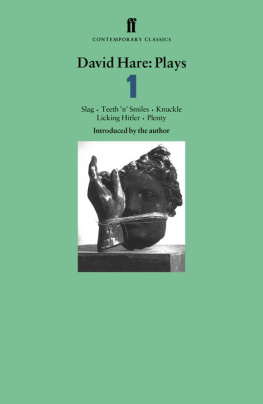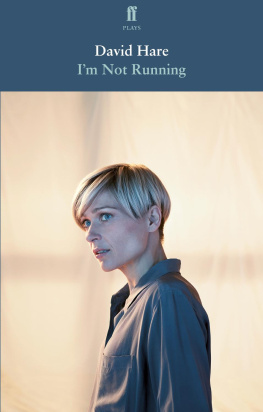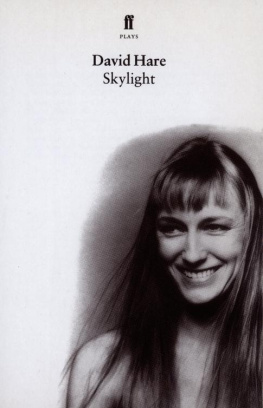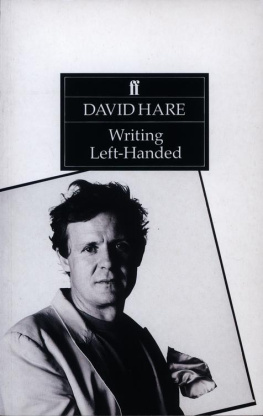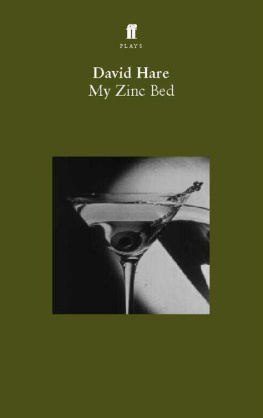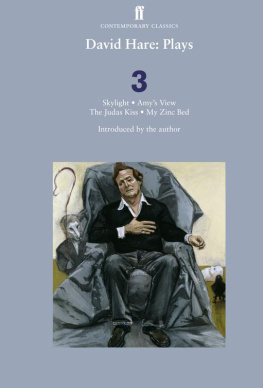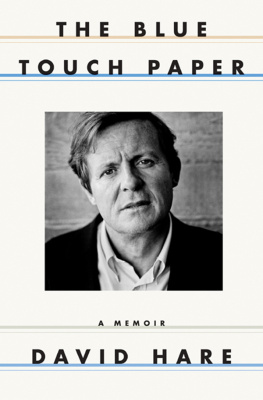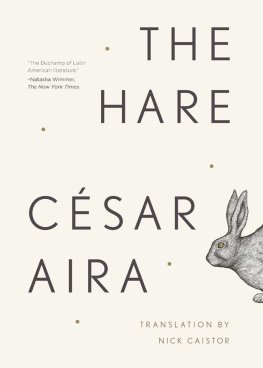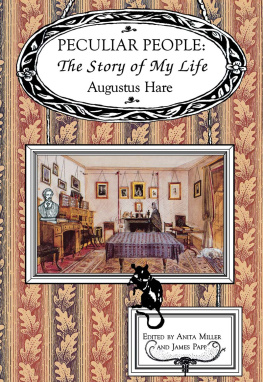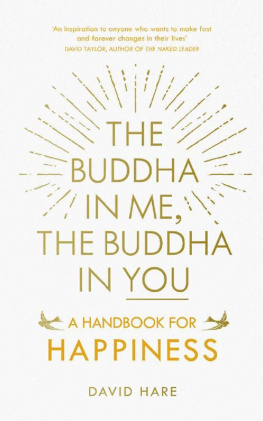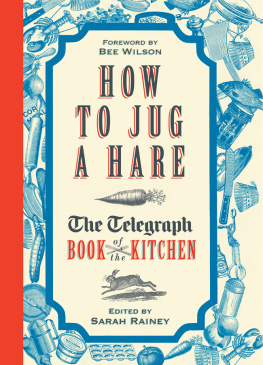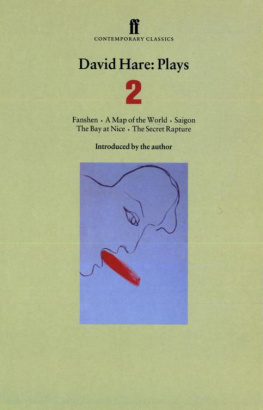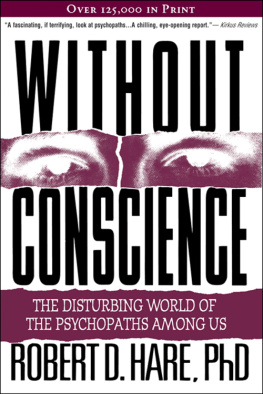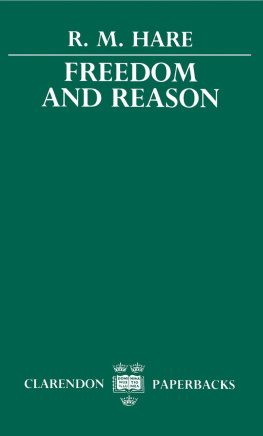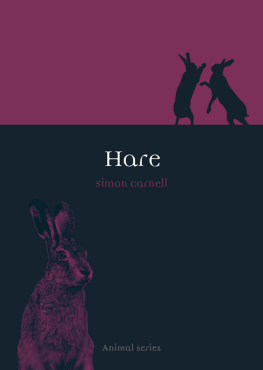Hare - David Hare Plays 1
Here you can read online Hare - David Hare Plays 1 full text of the book (entire story) in english for free. Download pdf and epub, get meaning, cover and reviews about this ebook. City: Boston;London, year: 2013;1996, publisher: Faber & Faber, genre: Detective and thriller. Description of the work, (preface) as well as reviews are available. Best literature library LitArk.com created for fans of good reading and offers a wide selection of genres:
Romance novel
Science fiction
Adventure
Detective
Science
History
Home and family
Prose
Art
Politics
Computer
Non-fiction
Religion
Business
Children
Humor
Choose a favorite category and find really read worthwhile books. Enjoy immersion in the world of imagination, feel the emotions of the characters or learn something new for yourself, make an fascinating discovery.
- Book:David Hare Plays 1
- Author:
- Publisher:Faber & Faber
- Genre:
- Year:2013;1996
- City:Boston;London
- Rating:3 / 5
- Favourites:Add to favourites
- Your mark:
- 60
- 1
- 2
- 3
- 4
- 5
David Hare Plays 1: summary, description and annotation
We offer to read an annotation, description, summary or preface (depends on what the author of the book "David Hare Plays 1" wrote himself). If you haven't found the necessary information about the book — write in the comments, we will try to find it.
David Hare Plays 1 — read online for free the complete book (whole text) full work
Below is the text of the book, divided by pages. System saving the place of the last page read, allows you to conveniently read the book "David Hare Plays 1" online for free, without having to search again every time where you left off. Put a bookmark, and you can go to the page where you finished reading at any time.
Font size:
Interval:
Bookmark:

He immediately asked me to write a full-length play. Slag was produced originally at Hampstead in 1970. It was then revived a year later by the Royal Court who had a gap in their programme. They therefore picked it up and put in a starrier, though equally excellent, cast. Michael went on to be involved with my first four plays. Q: Youcouldalsocall Slag asatire. Oh certainly.
By one of those coincidences of timing that have been a feature of my life as a writer, I had started reading some of the wilder feminist writings of the period, and in between the time when I began writing the play and its subsequent production the whole subject of womens liberation had become hotly topical. Germaine Greer had been clever enough to corral some of the ideas that were in the air and impose her extraordinary intellectual discipline on them to write TheFemaleEunuch. It was both a wonderful and a popular book. This meant by the time the audience reached the theatre, they were, if you like, ready for the fun. Q: Youhavesaid Slag isaboutyourownschooldays. The most useless advice any writer can be given is: write about what you know. How can a writer do otherwise? Perhaps a better injunction might be: write about what you know, but make sure you transform it.
Fiction is only interesting if it involves a true act of imagination. Nol Coward made me laugh when he described Slag as five very good scenes and one bad one. Im afraid he was being generous. But what dreamlike vitality the play does have is entirely from my imagining something about which, by definition, I can know nothing: what its like to be in an all-female community. Q: Didyouimagineatthattimeyouweregoing,primarily,tobeacomicwriter? I honestly didnt think about it. In all the plays I wrote in the seventies there is a powerful element of scorn.
Scorn, Id say, rather than anger, because I was impatient with an old England which had transparently collapsed, and yet the illusion of which still gripped our thinking and feeling. And, of course, scorn is best expressed comically. I love satire because I think its so good for you. Derisive public laughter is powerfully democratic. I was delighted with a recent humourless academic publication, claiming to be about my plays. It reviles them on the wonderful grounds that theyre full of jokes.
I loved that. Nothing threatens the ivory tower more than a good laugh. But it was a confusion about whether I was indeed a satirist or something else which led to my meeting Peggy Ramsay, who became my agent, and, I would say, the formative influence on my play writing life.
Recently, Ive read Harold Blooms book, TheWesternCanon, which asserts that any serious writer belongs consciously to a tradition and feels him or herself to be in some sort of direct dialogue with the great Western writers. I must admit I have no sense of this. When I am asked to name playwrights who have been an influence on me, I am stumped to name any. If that seems immodest, then I can only say, on the contrary, I admire plenty of playwrights and a good many among my contemporaries yet it seems to me the more you admire a writer, the less you want to imitate them.
The least attractive part of Shaw or Joyce or Tolstoy is the part that feels itself in competition with Shakespeare. And indeed those playwrights in my lifetime who have sought, say, a deliberately Shakespearian dimension to their work seem to me to have gone alarmingly astray. What influences me in my writing is not literature but life. And nobody has ever given me more courage to write than Peggy. Q: Whatdoyoumeanbythat? Well, I wrote three plays all satires before I wrote Knuckle. Admittedly its still pastiche.
Its based on the idea of re-setting an American thriller in the deepest Home Counties of England. Nevertheless, it does have, distinctively, the first stirrings of a slightly different voice, a voice which is in earnest. The play has a morality. The hero doesnt get the girl precisely because he behaves badly. My first agent, who had taken me on in the hope that I would rip merry hell out of contemporary society, was horrified by the play. He told me that I should stick to writing jokes.
It was his reaction that impelled me to give the play to Peggy Ramsay. Peggy was an ex-opera singer very brilliant, very forthright. In the fifties she had started a literary agency which was run with a carefree kind of vigour and enthusiasm which was unique in theatrical London. When she read Knuckle she was so excited she broke her lifetime rule. She put her own money into a clients production. It was a play she was determined to fight for.
I have to make clear I think Peggy the most impassioned and literate fighter of the post-war British theatre.
Alongside Joan Littlewood, John Osborne and George Devine, she is one of its unequivocal heroes, though perhaps the least known. There are at least a dozen writers, the most famous of them Joe Orton, who owe a good part of their prosperity to her championship. She was never better, or livelier, than when defending an author who was ahead of public taste. So when Knuckle finally opened, disastrously, in the week after Edward Heaths election called to decide Who Runs Britain, it was Peggy who steadied my nerve and kept me writing through the distinctly choppy months that followed. Q: Thecriticshatedit? Not entirely. It had one or two powerful advocates, including the late Harold Hobson in the SundayTimes. One or two critics, like Irving Wardle, who then wrote for TheTimes, were kind enough later publicly to admit that theyd misjudged the play on first viewing.
But theres no doubt that the whole venture of producing a play which attacked the capitalist system in a West End theatre had a symbolic significance which somewhat obscured the text. It evoked responses which were, shall we say, not entirely literary. Through all the resulting disappointment, it was Peggy who constantly reassured me that its not finally very important how any individual play in a writers life is received. The long run is what matters. She always told me she believed I would still be writing in twenty years time. If I am, it is, in part, thanks to her.
She had a perspective and a sangfroid which I entirely lacked.
Reading it now, of course, the play does seem modestly prophetic. It is organized round the two types of British capitalism which ten years later were to clash so violently: the paternalistic kind with its old social networks and its spurious moralizing, and the new aggressive, shameless variety which would gain such ascendancy in the 80s.
Font size:
Interval:
Bookmark:
Similar books «David Hare Plays 1»
Look at similar books to David Hare Plays 1. We have selected literature similar in name and meaning in the hope of providing readers with more options to find new, interesting, not yet read works.
Discussion, reviews of the book David Hare Plays 1 and just readers' own opinions. Leave your comments, write what you think about the work, its meaning or the main characters. Specify what exactly you liked and what you didn't like, and why you think so.

